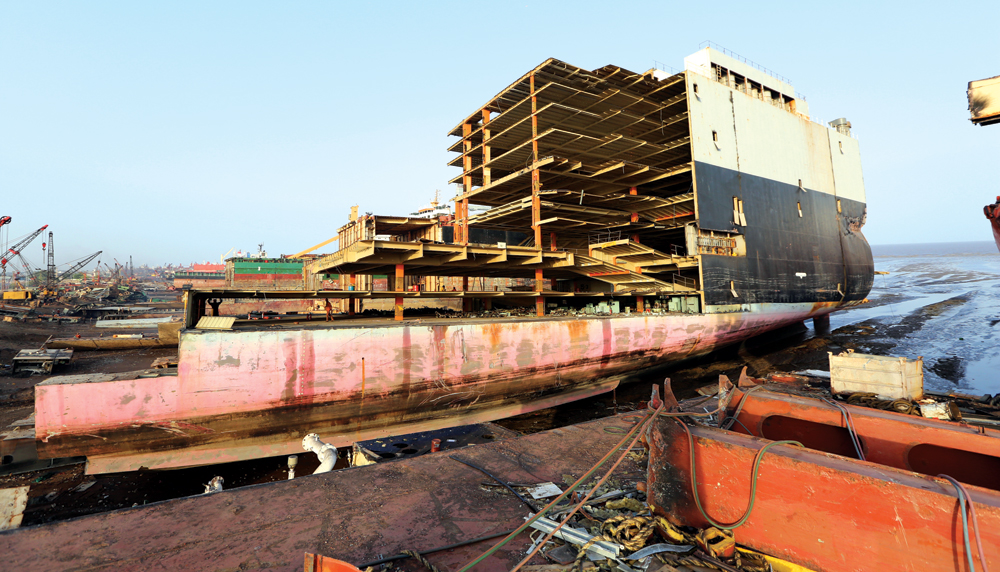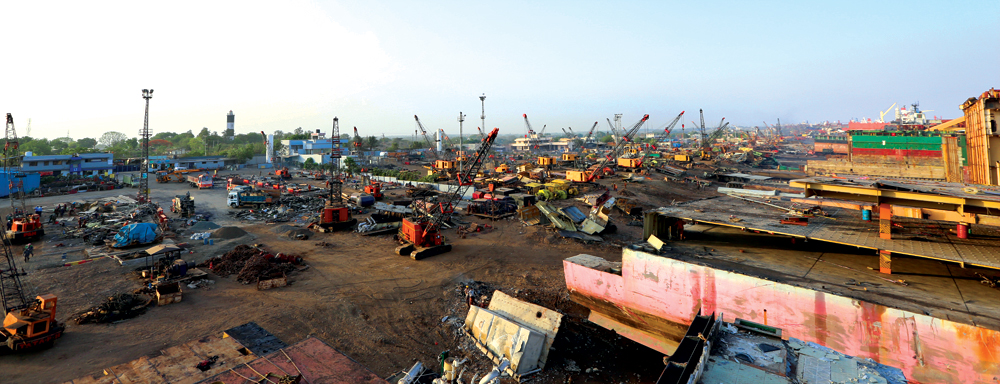
Alang is widely known as the largest graveyard in the world for ship demolitions. Ship recycling yards in India, Pakistan, Bangladesh and China, handle over 90% of all ocean-going vessels demolished in the world. A ship traded in international waters in its economic life might have never called at any Indian port; however, many of these ships come to India for demolition upon completion of their lives.
The ship-demolition business was controlled by yards in the US and Europe till the 1970s. However, with rising labour wages in the Western world, this industry shifted to Asia, where labour was available abundantly and at lower costs. India made a strong pitch for this business in the 1980s and the first vessel, M.V. Kota Tenjong, beached at Alang on 13th February 1983. Since then the business has grown multifold at Alang, and presently there are 153 beaching plots sp read over a coastline of 10 km.
Alang is the preferred location for ship scrapping primarily owing to its location. It has one of the highest tidal variations in the coastal regions of the Indian sub-continent. Further, during high tide the ocean currents are very strong, leading to vessels coming ashore with relative ease. Another advantage of Alang is the availability of a large force of unskilled workers at affordable costs, who are able to perform the majority of demolition activity manually. Owing to such multiple advantages, Alang handles almost half of all vessels demolished in the world.
Presently the shipbreaking industry in Alang provides direct employment to over 50,000 workers coming from different parts of country. There are further labourers engaged in ancillary industries like steel rolling mills, scrap traders, oxygen gas plants, furniture traders, transporter, real-estate, etc. The industry contributes substantial revenue to the central and state government in the form of taxes. In its latest budget announced in February 2021, the Indian government announced a series of measures for further development of this industry. It is expected that the annual shipbreaking capacity of India will double from 4.5 million tonnes to 9 million tonnes LDT by 2024. This is also expected to generate employment to over 150,000 people. There are also plans to set up container manufacturing units in this region, which can utilize the scrap steel that comes out of shipbreaking.
- Hongkong Convention
Alang had also attracted lots of attention in the past for the deploring conditions in which the labour force had been working, with minimal regard to safety. A lot of effort has been put by the government and the Ship Recycling Association and other bodies to spruce up the facilities at Alang. India became a signatory to the Hongkong Convention in 2019 and presently most of the demolition yards have exhibited proper SOP in place for safe and environmentally friendly ways of breaking a ship. No toxic or metallic wastes are dumped into the sea. The workers are provided necessary safety gear and taught about safe working practices. Further, the yards have set up basic accommodation and medical facilities for the workers attached to their companies. Owing to the various positive measures taken, many of the yards comply with the Hongkong Convention on Ship Recycling prescribed by the IMO. There have been numerous independent studies by international agencies that eventually gave clean chit to the yards, resulting in ships from Europe and other developed nations heading to Alang for demolition.
- Ship Agency For Ship Recycling
Vessel agency for ship recycling is a very complex job and J. M. Baxi & Co. has been performing this task regularly since the emergence of this industry in the 1980s. There are numerous tasks involved requiring parallel co-ordination between the seller, i.e. the shipowner, the buyer, beaching yard or their trading counterpart, government authorities viz. customs, immigration, Gujarat Maritime Board Port Office, the manning agency for the signing-off crew and others. Preparations for these activities starts days in advance and meticulous planning has to be done for all tasks to be performed within a window of a day of two maximum. In order to have seamless operations at minimal costs to the shipowner, JMB had set up a dedicated ship dismantling desk in Bhavnagar, which is about 50 km from Alang.
This team guides the vessel to the location to drop its anchor, which depends on the draught of the ship. The JMB team thereafter arranges for boarding of government officials and other stakeholders at anchorage through tugboats. This requires precise coordination for using minimum anchorage boarding as otherwise every boarding involves lots of time and expenditure. All paperwork has to be done expeditiously so that the vessel can beach in the allotted time, otherwise missing a tide might mean the vessel would have to wait for the next tide, perhaps a fortnight away. JMB has been able to consistently perform successful beaching of many vessels over the years and this has regularly been appreciated by shipowners.
- Demolition Activity Post Lockdown
During the COVID-19 pandemic, from the last week of March till early June, the beaching of vessels at Alang stopped. With no jobs at hand, there was an exodus of many migrant labourers to their native places, which in a big country like India was often far off. The government allowed ship-demolition activity to start in stages in June 2020, and the Gujarat Maritime Board played a very proactive role in supporting the industry to bounce back to normalcy within days. There were numerous hiccups in the initial days, but the industry was back buzzing with activity before long. During the year 2020, a total of 196 vessels beached in Alang, as against 182 the previous year.

For JMB, apart from the coordination between various agencies, the biggest challenge was to sign off the crew and repatriate them home safely. A few hotels in Alang started functioning in June with limited capacity, which meant there was a shortage of hotel rooms in Alang. This was compounded by the fact that there were no international flights operating out of India during that time, which meant the signed-off crew were occupying the hotel rooms for a longer duration and hence the room shortage increased. Further, the crews had to be kept in safe and secure condition so as not to get infected with the virus; hence they were effectively locked inside their rooms altogether for days. The government granted extended visas to the signing-off crew till the agents could find suitable repatriation options.
Post lockdown, JMB handled 15 vessels at Alang, which included tankers, parcel tankers, bulk carriers and car carriers. As with all vessel demolitions during that period, the most important task was to ensure safety of seafarers. All crew were put up in hotels, which were evaluated by the JMB in advance for the safety protocol the hotels had put in place. Unfortunately, in one instance, one of the signed-off crew tested COVID positive. JMB ensured that the affected crew was given proper and timely medical attention. The rest of the crew also had to be put under mandatory quarantine for 14 days. This meant all arrangements for hotels and transport had to be reworked within the limited options available at that time.
Through a mix of private chartered flights and regular commercial flights, all crew were safely repatriated home. JMB arranged for the repatriation of over 400 crew members and there was not a single case where the crew was unable to board a flight or take a connecting flight for want of necessary documents, including a COVID test report conducted within 72 hours. The JMB team did all the running around, gathering all the permissions, so that each seafarer could reach his family in a safe and secure manner.